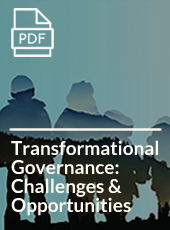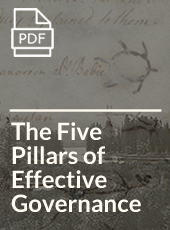FEATURED: Publications

A Brief History of our Right to Self-Governance
Explore the unbroken history of First Nations right to self-governance, a right rooted in our occupation and our own jurisdiction over the land before contact. In recent years aboriginal and treaty rights and title have been addressed by Canadian courts and, for many First Nation citizens, the movement for self-governance is a way to reaffirm authority in relation to the land.

Transformational Governance: Challenges and Opportunities
How do we involve our community members in transforming governance? How do we steward our territories, preserve sacred places, and reconnect with the land to revitalize our culture and values? How do we develop the capacity necessary to achieve self-determination? How do we write culturally appropriate laws and create governing structures that are strong enough to replace the Indian Act? First Nations leaders and administrators, academics and other experienced individuals talked about the challenges and opportunities of working towards self-governance. Their dialogue is summarized in this publication.

Indian Act vs Self-Determination
A side-by-side comparison of Indian Act self-administration vs Inherent Right self-government. This one page document explains what self-determining First Nations can do with governing structures, law making, citizen involvement, lands and resources, finance and economy, and their relationships with other governments.

Seven Steps to Nation Rebuilding
Start by creating a movement for change. Aim for delivering good governance: Seeing children learning your language; being engaged in the economy and stewardship of your lands; governing according to your customs and traditions; having true nation-to-nation relations; seeing pride in your communities – these are outcomes we can all strive for as we restore our nation’s governance.

Five Pillars of Effective Governance
These five pillars of effective governance blend the traditional values of our respective Nations with the modern realities of self-governance. The Centre uses the principles behind these five pillars to develop and deliver tools and services to assist in rebuilding First Nations. The Centre believes that all First Nations have the ability to enact all or some of these principles no matter where they sit on the path to self-governance. All First Nations wrestle with significant constraints such as a lack of funding, the restrictions of the Indian Act, and poverty, yet effective governance is the foundation upon which our development aspirations must be built. Therefore, we must engage with these principles – our long term success depends on it.
